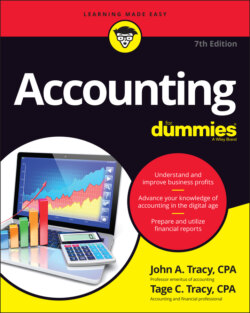Читать книгу Accounting For Dummies - John A. Tracy - Страница 16
Providing Vital Financial Information
ОглавлениеIn a nutshell, accountants “keep the books” of businesses — and of not-for-profit (NFP) and government entities also — by following systematic methods to record the financial activities of the entity. All this recordkeeping is done for one primary purpose: to create the database necessary for the preparation of complete, accurate, reliable, and timely financial reports, tax returns, and other types of financial communications. In financial reports, accounting information is presented in the form of financial statements that are packaged with other information such as explanatory footnotes and a letter from top management. Accountants design financial reports for nonaccountants, such as business owners, lenders, and investors.
Financial reports are sent to people who have a stake in the outcomes of the activities. If you own stock in Microsoft, for example, or you have money in a mutual fund, you receive regular financial reports. If you invest your hard-earned money in a private business or a real estate venture, or if you save money in a credit union, you receive regular financial reports. If you’re a member of a nonprofit association or organization, you’re entitled to receive regular financial reports. We hope you carefully read these financial reports, but if you don’t — or if you do yet don’t understand what you’re reading — it could be that you don’t understand the language of accounting.
One important reason for studying accounting is to make sense of the financial statements in the financial reports you get. We guarantee that Warren Buffett knows accounting and how to read financial statements. We sent him a copy of our book How to Read a Financial Report (John Wiley & Sons, Inc.). In his reply, he said he planned to recommend it to his “accounting challenged” friends.
